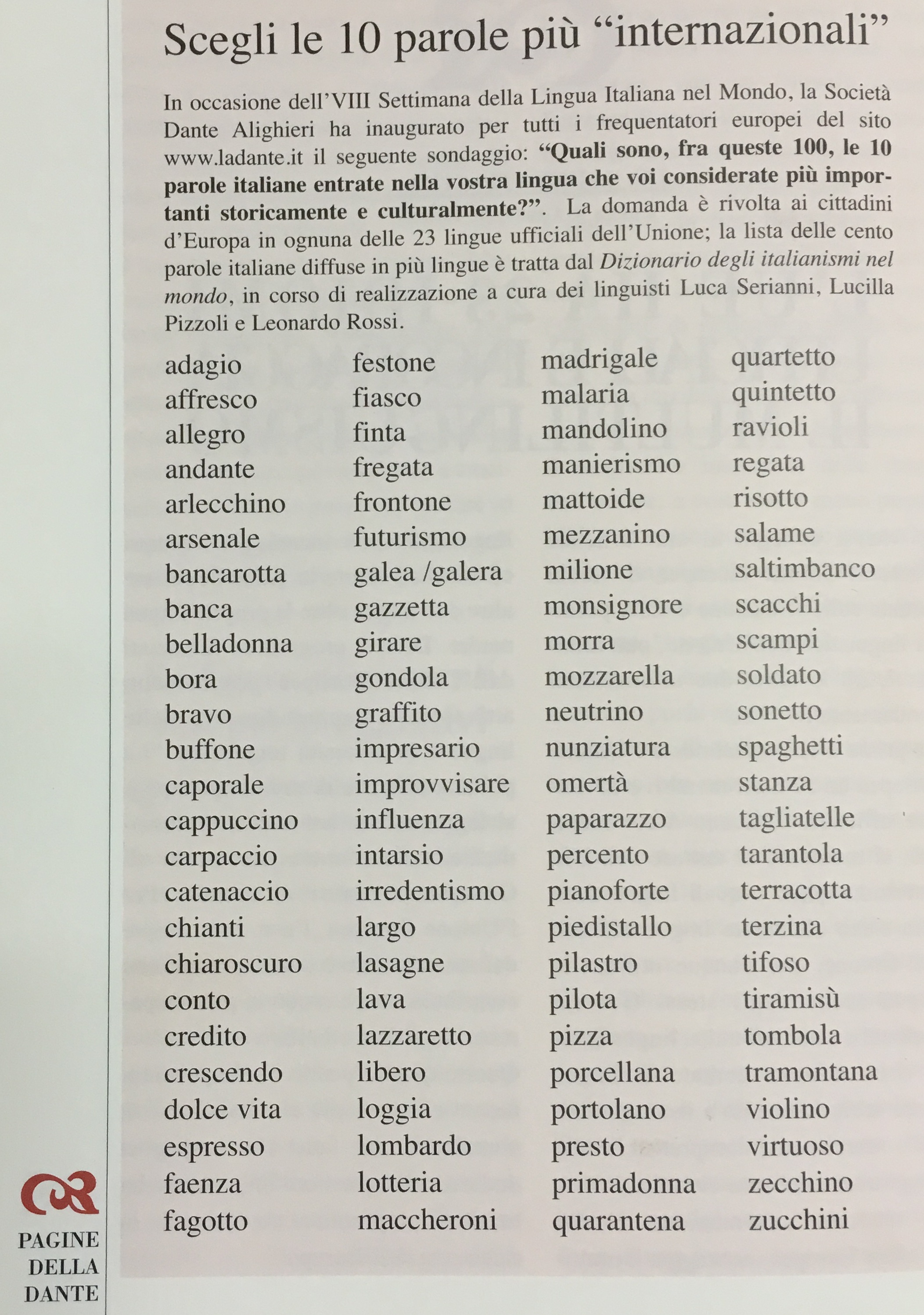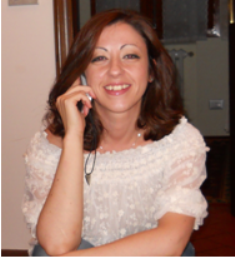Dear students,
Which words in Italian amongst these ones do you know that are the same in your native language?


Dear students,
Which words in Italian amongst these ones do you know that are the same in your native language?

An important role in learning another language is using the body language. Sergio Solazzo, an Italian tourist guide, explains to an American audience all Italian gestures in a way you can have an whole conversation with no words and only using hands.
Dear Italian readers,
Click on the picture to watch the short video
Ciao a tutti!
We would like to congratulate all our brilliant students who successfully passed the PLIDA exams and took the PLIDA certification!
Congratulazioni a Joe Castro, Nevila Dhima e Kris Adams per la certificazione PLIDA A1, Maxwell Coen e Jean Locicero Shankle per la certificazione PLIDA A2, Brooke Chamberlain Cook e Carl Iovanni per la certificazione PLIDA B1, Scott Sminkey, Henry DeBenedetto, Krysten Modrzejeski per la certificazione PLIDA B2, Katherine Rao per la certificazione PLIDA B2 e C1!
Siamo orgogliosi di voi, siete studenti BRAVISSIMI!!!!
Here are a few pictures of the PLIDA certification ceremony during the last Open House, December 1st 2015.
Also, we would like to warmly thank our President, Mr Anthony Cassano for his support, Prof. Cecilia Mattii, Director of the PLIDA program, Sal Bramante, VP of the Dante Alighieri Society and Language Coordinator Maria Cristiano for overseeing the PLIDA Certification Project!

Congratualazioni a Katherine Rao per il conseguimento della certificazione PLIDA B2 e C1! Da sin. Emanuele Capoano, il presidente Anthony Cassano, la prof. Cecilia Mattii, la Language Coordinator Maria Cristiano e Katherine Rao.
Discover Italy Without Leaving Boston? Now You Can! Join Us!
Get a sense of what it will be like taking classes at the Dante by attending our winter trimester.
Open House will be on Tuesday, December 1, 2015 from 6:00 PM to 8:30 PM
Students will be able to:
Evening program:
New and current students are welcome!
Dante Alighieri Society of Massachusetts, Inc.
41 Hampshire Street, Cambridge, MA 021399
Tel. 617-301-8354
Cari studenti e studentesse,
there is a great new podcast for Italian learners. And it’s for free! It’s recorded by the Educational Office at the Italian Consulate in Boston. You can listen to the easy news in a slow pace and it is for all levels. You can also download the transcript under each clip.
BUON ASCOLTO! LISTEN HERE THE EASY NEWS IN PODCAST.
 Also, there is a photo contest issued by the Italian Embassy in U.S. Take a picture that creatively showcases what you’re most thankful for about Italy and its culture. The picture, which can be taken in either the United States or Italy, must be an original image.
Also, there is a photo contest issued by the Italian Embassy in U.S. Take a picture that creatively showcases what you’re most thankful for about Italy and its culture. The picture, which can be taken in either the United States or Italy, must be an original image.
When you have your photo ready, submit it here and/or through Twitter or Instagram with the hashtag #ItalyinUS by October 21st, 2015.

Monumenti e simboli italiani
Once submitted, Facebook users will have the chance to vote for their favorite photo. On October 22nd, 2015, the photos with the most votes will be deemed the winners, and each user will be rewarded with their appropriate prize.
Discover Italy Without Leaving Boston? This Winter You Can!
Get a sense of what it will be like
taking classes at the Dante
by attending our winter trimester
Open House
Tuesday, December 9, 2014 from 5:30 PM to 8:00 PM
Students will be able to:
–Speak with teachers and the PLIDA Language Coordinator
– Learn about the communicative approach
– Test their Italian proficiency
– Sign up for the trimester “Winter 2015”
-Watch videos of our courses
In addition:
New and current students welcomed!
Dante Alighieri Society of Massachusetts, Inc.
41 Hampshire Street, Cambridge, MA 021399
Tel. 617-301-8354
Ready for the fall? – SIGN UP HERE –
The new season is upon us, and we’re ready for a new set of Italian classes for beginners, false beginners, intermediates, as well as review lessons Non-Plida and new syllabus of lessons for advanced students under the Plida Certification.
Our classes are always lively, fun and interactive, as you’ll see in the cooking presentation video below from our student Lucia. We don’t want to go so far to say “throw grammar from the train,” but we like to do hands on practice before starting on grammar – “prima la pratica e poi la grammatica.”
What did you do this summer? Did you go somewhere cool on vacation, or have a delicious barbeque? Tell us all about it in Italian on the first day of class!
 My name is Benedetta Rossi and I grew up in Bologna, a little city in the Northeast of Italy. I moved to Boston in 2009 to follow my husband, who is a researcher in immunology at MGH.
My name is Benedetta Rossi and I grew up in Bologna, a little city in the Northeast of Italy. I moved to Boston in 2009 to follow my husband, who is a researcher in immunology at MGH.
This is my third year at Dante Alighieri Society as a teacher, and I like this experience. I feel like at home.
EDUCATION:
I received degrees in classical studies in Bologna.
Also, I attended the “ Alma Mater Studiorum” of the University of Bologna with a focus in Italian, Latin and Greek grammar and literature.
CLASSES TAUGHT:
In Italy, I started teaching at High School, Gymnasium and Lyceum, in 2002. I taught Italian, Latin and Greek grammar and literature. Also, I taught Philosophy and History. In Boston I am currently engaged as a Language Instructor at Dante Alighieri Society and, also, I am Teacher of Italian at Nempac Institute in the North End. I also taught at Cambridge Adult of Education, along in an elementary school and a community center in Boston.
In the 2013 I started doing the speaker at the radio show “News in slow Italian” (www.newsinslowitalian.com) along with actor and speaker Emanuele Capoano.This programme is directed to students desiring to improve comprehension of Italian through radio listening.
People say that I have an excellent ability to interact with colleagues and to act as a team player, developed during my experience as a school teacher, and an outstanding ability to interact with students, who regularly express appreciation for my patience and courtesy.
The Dante Alighieri Society is a great place to be and to learn and breathe the Italian language, culture and atmosphere. I love to teach here, love the PLIDA philosophy of teaching, and love love love to learn with my students. To learn a new language and culture is amazing!
In fact, here below I will attach a final presentation’s link of a student in the BEGINNER CLASS. I’m so proud of all of them.
Click here to see: Italiano 101 – Angela Livino.pptx
CONTACT INFORMATION:
My e-mail address is: benedetta.rossi.PLIDA@gmail.com
In this post, since the last one, we are continuing to show you another teacher’s presentation at our school. Today, we’ll do in a short video (14 minutes) that is an example of a lesson in our Italian classes at Dante Alighieri Society of Massachusetts. Then, let Valeria leto have the floor with her teaching philosophy.
I truly believe that teaching is not about knowing a subject, instead it is more about transmitting the passion you have about a topic, giving the students the tools to achieve their goal easily and in a relaxed environment. My main goal is not to catch my students unprepared, instead it is to make them learn as much as they can. In order to do so, I assign homework daily and insist that it be handed in on time, but on the other side I praise the students when they write a good composition, or participate in class, and try hard to improve. I also believe that it is extremely important, especially for language acquisition, that the learning be based on a communicative approach. This means that, instead of learning the grammatical rules in a book, it is fundamental to reproduce real life situations in which the grammar comes out of activities such as role-plays, games, songs, movies, working in pairs and all those activities that improve the four abilities (speaking, reading, listening and writing) required for a good mastery of a language. In order to achieve this aim, I base my lessons on an innovative method of didactics known as VAKT. According to the theorists supporting this method, this learning style uses the four main sensory receivers: Visual, Auditory, Kinesthetic and Tactile to determine the dominant learning style. It is based on modalities—channels by which human expression can take place- and it is composed of a combination of perception and memory. Learners use all four modalities to receive and learn new information and experiences. This dominant style defines the best way for a person to learn new information by filtering what it is to be learned, and this may not always be the same for any task. The learner may prefer one style of learning for one task, and a combination of others for a different task. This allows all learners the opportunity to become involved, no matter what their preferred style may be.
I also believe that it is important that each student feels a part of the class and contributes to the whole group. For this reason I periodically assign to each student a task he/she will have to develop on his/her own and then present to the class. In this way each student perceives that he/she is contributing to the others. To further improve the interaction between every member of the class I use e-learning platforms that are built around that specific class needs, taking advantage of what I learnt during my Master’s degree in Technologies and Didactics of Languages. (Valeria Leto)